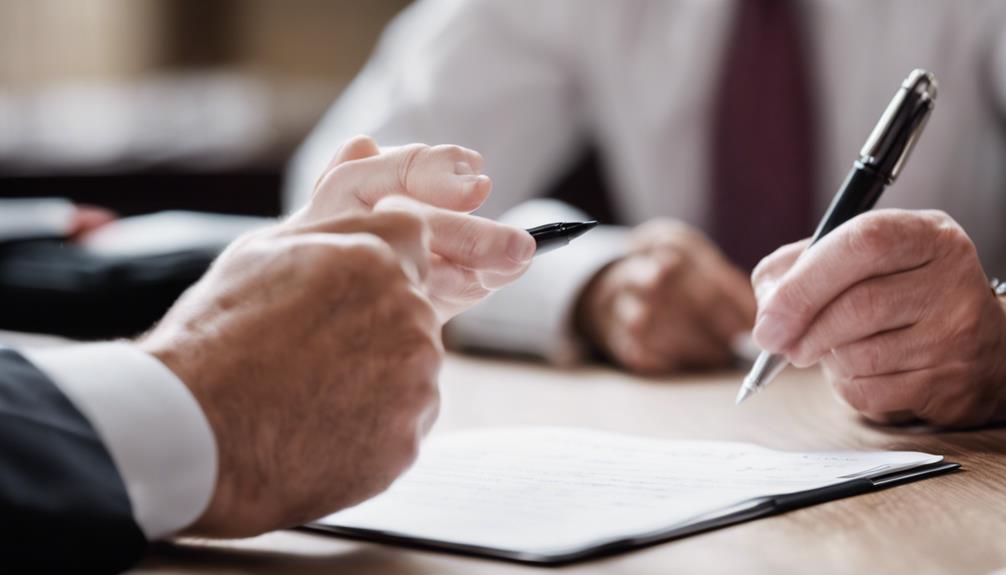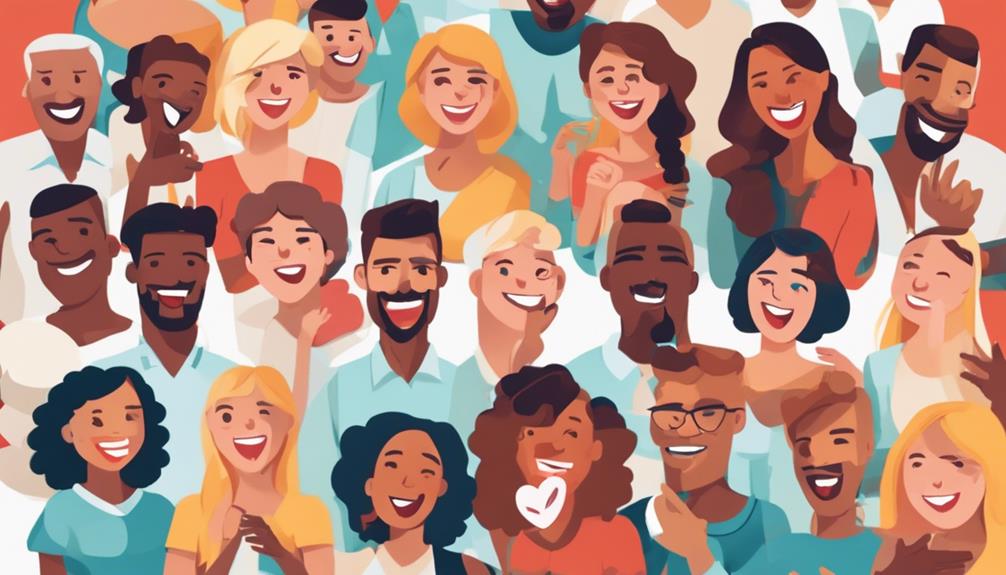As we explore the complexities of navigating legal issues for deaf clients, the skills of ADA lawyers stand out as a beacon of hope in times of uncertainty. Successfully advocating for the rights of individuals with hearing impairments requires a blend of legal expertise and empathetic communication.
From deciphering complex ADA regulations to empowering deaf clients with the tools they need for equal access to justice, the journey towards inclusive legal representation is both challenging and rewarding.
Let's explore the essential tips and strategies that can transform the legal landscape for deaf individuals seeking justice.
Key Takeaways
- Provide qualified sign language interpreters for effective communication.
- Advocate for equal access to justice and accommodations.
- Empower deaf clients through tailored communication strategies.
- Utilize innovative technologies and resources for enhanced accessibility.
Understanding ADA Basics
Understanding ADA Basics involves ensuring effective communication for deaf clients is a fundamental requirement for all lawyers under the Americans with Disabilities Act (ADA). When serving deaf clients, it's essential to provide communication that's equally as effective as that provided to clients without disabilities. The ADA mandates that communication should be accessible, timely, accurate, and in a format that's easily understood by the deaf individual. This means that lawyers must be prepared to accommodate various communication needs, such as providing sign language interpreters, using assistive listening devices, or utilizing video relay services.
Furthermore, effective communication is a two-way street. Lawyers need to not only convey information clearly to their deaf clients but also ensure that they understand the information being shared. It's crucial to engage in a dialogue with deaf clients to determine their preferred communication methods to facilitate seamless interaction. By prioritizing effective communication with deaf clients, lawyers demonstrate their commitment to upholding the principles of the ADA and promoting inclusivity within their practice.
Communication Strategies for Deaf Clients
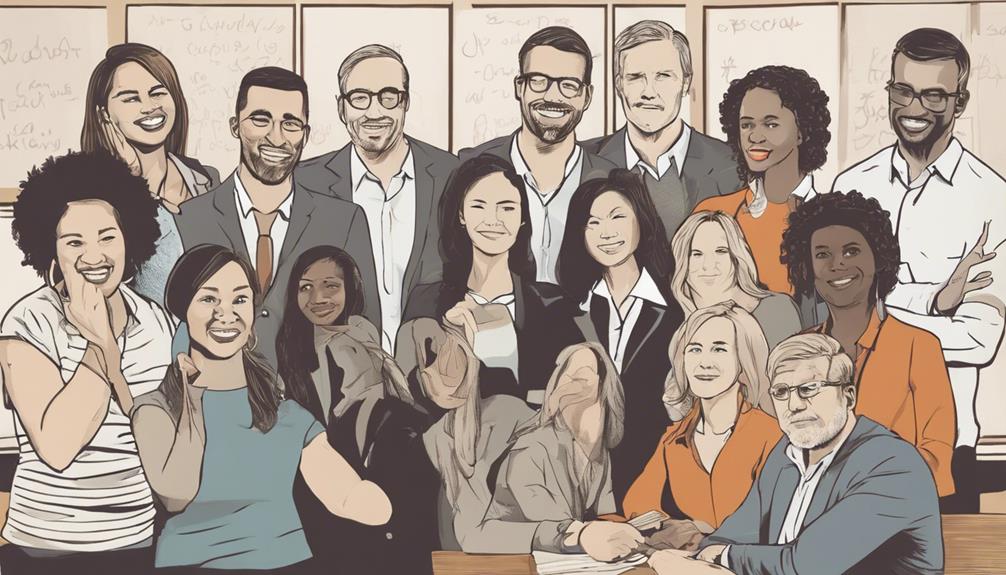
To effectively support deaf clients in legal matters, it's vital for lawyers to implement communication strategies that cater to their specific needs, such as providing qualified sign language interpreters or offering alternative communication methods like CART services or assistive listening devices. Understanding the nuances of communication with deaf clients is essential for ensuring they receive fair representation. Here are some key strategies to consider:
- Qualified Interpreters: Providing skilled sign language interpreters helps bridge the communication gap between deaf clients and legal professionals.
- Alternative Methods: Offering CART services or assistive listening devices can enhance communication effectiveness in legal settings.
- Tailored Approaches: Understanding the unique communication needs of each deaf client is crucial for personalized and effective representation.
- Visual Aids and Technology: Incorporating visual aids, written materials, and leveraging technology can further facilitate clear and concise communication during legal proceedings.
Rights of Deaf Individuals
As ADA lawyers, we understand the importance of recognizing the legal protections afforded to deaf individuals. Ensuring communication accommodations in law is vital to guarantee effective representation for our deaf clients.
Discrimination against deaf individuals due to failure to provide reasonable modifications is a serious concern that can lead to legal consequences.
Legal Protections for Deaf
Deaf individuals are afforded legal protections under the Americans with Disabilities Act (ADA), ensuring they aren't subject to discrimination based on their disability. When it comes to legal protections for deaf individuals, there are crucial points to consider:
- The ADA mandates that legal offices provide effective communication for deaf clients.
- Deaf clients have the right to request reasonable accommodations, such as qualified interpreters.
- Lawyers must adhere to ADA guidelines by offering auxiliary aids and services.
- Understanding these legal protections is essential for providing effective representation.
Communication Accommodations in Law
Transitioning from legal protections for deaf individuals under the ADA, ensuring effective communication accommodations in law is paramount for providing equitable access to justice for all clients, including those with hearing impairments. Lawyers have a duty to offer communication aids such as sign language interpreters, CART services, and assistive listening devices to facilitate two-way communication with Deaf clients during legal proceedings. These accommodations are not just recommended but are required by the ADA to prevent discrimination against individuals with hearing impairments. By asking Deaf clients about their preferred communication methods, lawyers can tailor their approach to meet specific needs, ensuring that legal consultations are inclusive and accessible. Failure to provide these accommodations may lead to legal consequences and hinder the rights of Deaf individuals.
| Communication Accommodations | Benefits |
|---|---|
| Sign language interpreters | Facilitate direct communication and understanding of legal matters |
| CART services | Provide real-time captioning for Deaf clients during discussions |
| Assistive listening devices | Enhance hearing abilities for Deaf individuals in legal environments |
| Client's preferred methods | Ensures personalized communication approach for individual needs |
| ADA requirements | Mandate the provision of effective communication aids for Deaf clients |
Discrimination Against Deaf
Discrimination against individuals who are deaf is a significant barrier to their access to legal services and rights under the Americans with Disabilities Act (ADA).
When considering the rights of Deaf people within the legal system, it's crucial to address the following key points:
- Discrimination against deaf individuals violates their rights under the Americans with Disabilities Act (ADA).
- Deaf individuals often face obstacles in accessing legal services due to a lack of accommodation and awareness among lawyers.
- Fear of reprisal can lead deaf clients to endure inadequate services rather than risk losing representation by speaking out.
- Some lawyers place the burden on deaf clients to provide their own interpreters, impeding effective communication and perpetuating discrimination.
It is essential to enhance training and awareness among legal professionals to ensure equitable access to justice for Deaf individuals.
Legal Accommodations for Deaf Clients
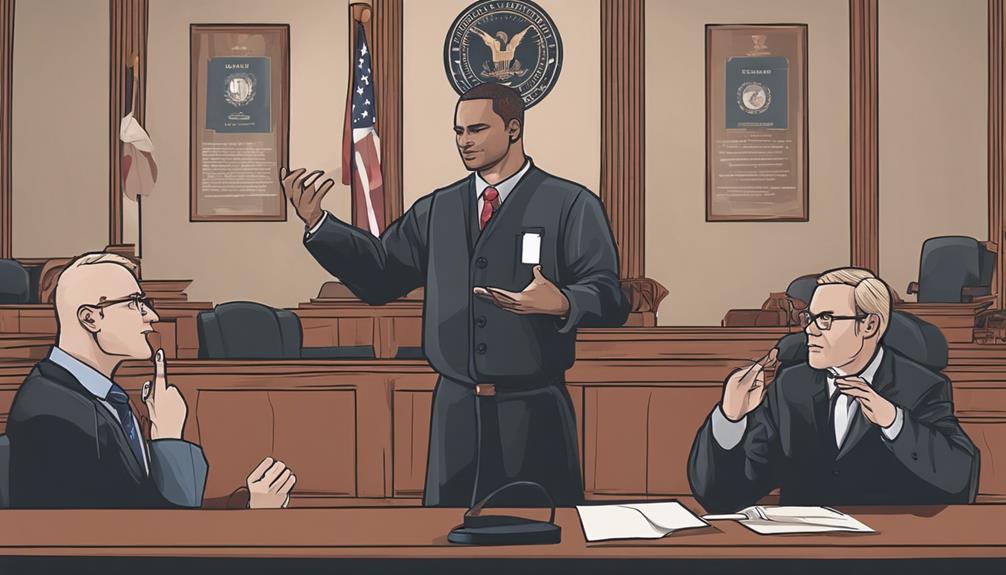
We must ensure that legal accommodations for deaf clients are in place, including communication access requirements such as sign language interpreters and video remote interpreting services. Providing these accommodations is crucial for effective communication and upholding ADA regulations.
Deaf clients' preferred communication methods should always be considered to ensure smooth and successful interactions.
Communication Access Requirements
To ensure legal compliance and equitable representation, lawyers must provide effective communication access for deaf clients, including necessary accommodations such as qualified interpreters and assistive devices.
When catering to clients with disabilities, it's crucial to ensure effective communication. Here are key points to consider:
- Utilize sign language interpreters proficient in legal terminology.
- Confirm the availability of assistive devices like video relay services.
- Train staff on how to interact effectively with deaf clients.
- Implement written communication alternatives for essential documents.
Sign Language Interpreters
In ensuring effective communication with deaf clients, providing qualified sign language interpreters is a legal mandate that attorneys must adhere to. American Sign Language interpreters play a crucial role in facilitating communication between legal professionals and deaf clients. It's essential to ensure that these interpreters are highly skilled, maintain confidentiality, and accurately convey information.
Deaf clients have the right to request specific interpreters for legal proceedings, and any issues with interpretation should be promptly addressed to uphold effective communication. Firms are responsible for covering the costs associated with providing sign language interpreters as part of accommodating deaf clients.
Video Remote Interpreting
Utilizing Video Remote Interpreting (VRI) can significantly enhance accessibility and communication for deaf clients in legal settings. VRI offers real-time video and audio communication, making legal consultations effective for deaf clients. It's a cost-effective solution providing immediate sign language interpretation services.
VRI platforms ensure confidentiality and privacy for attorney-client communications. Attorneys must ensure that VRI platforms meet ADA requirements for effective communication with deaf clients. By embracing VRI, attorneys can meet the needs of their deaf clients efficiently and in compliance with legal obligations.
This innovative approach not only improves communication but also fosters inclusivity within the legal profession.
Advocating for Equal Access
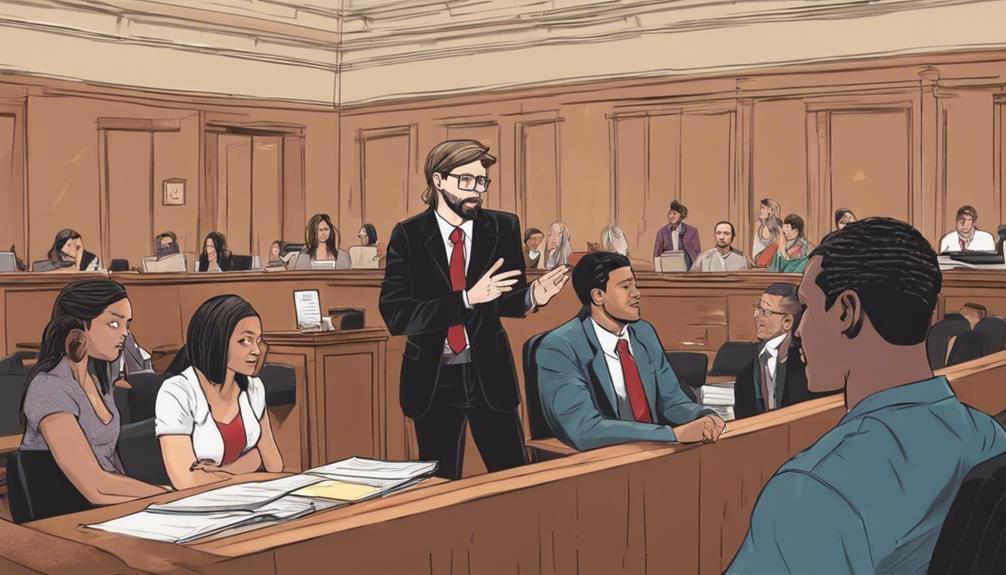
Advocating for equal access for deaf clients in legal settings is a fundamental obligation for lawyers under ADA guidelines. It's crucial to provide effective communication to ensure that deaf clients have equal access to legal services. Meeting ADA requirements isn't just a legal necessity but a moral imperative to uphold the rights of deaf individuals. Discrimination against deaf clients in legal settings is a violation of their basic rights and goes against the core principles of justice and inclusivity.
As advocates, we must work tirelessly to raise awareness among legal professionals about the importance of accommodating deaf clients. Sharon Caserta's efforts in educating lawyers highlight the need for proactive steps in this area. Deaf clients deserve not only equal access to legal services but also the assurance of effective communication with their legal representatives. By prioritizing these aspects, we can create a more inclusive and equitable legal environment for all.
Ensuring Effective Communication
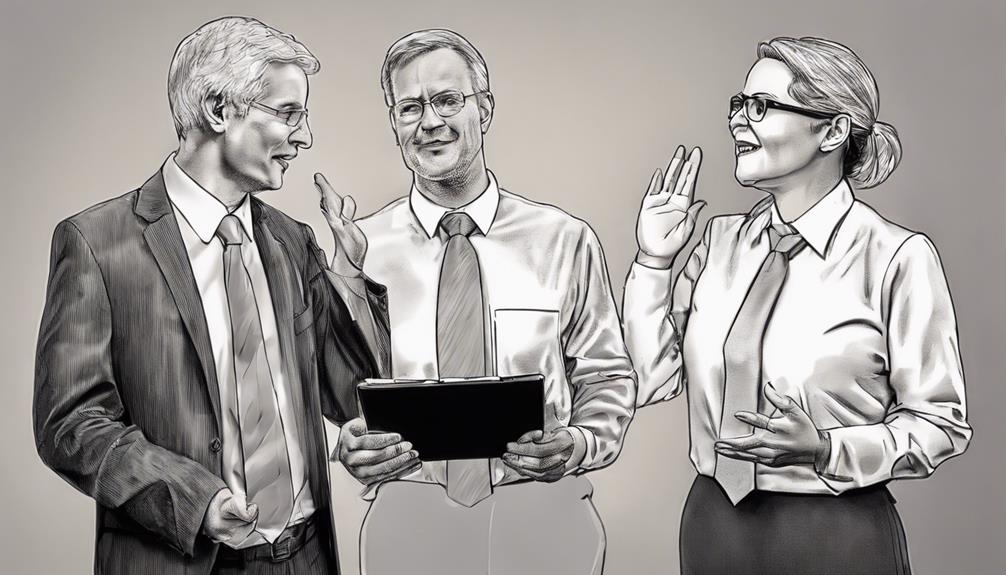
To ensure effective communication with deaf clients in legal settings, it's imperative for lawyers to assess and meet their specific communication needs promptly. When working with Deaf or Hard of Hearing people, the following steps are crucial for ensuring effective communication:
- Utilize Qualified Interpreters: Providing qualified interpreters is essential for facilitating accurate and clear communication between lawyers and deaf clients.
- Understand Effective Communication: Recognize that effective communication is a two-way process, requiring both parties to ensure clarity and understanding throughout legal proceedings.
- Implement Auxiliary Aids and Services: Utilize auxiliary aids and services such as CART (Communication Access Real-Time Translation) or assistive devices to enhance communication accessibility for deaf clients.
- Adapt Communication Strategies: Be flexible in adapting communication strategies to meet the unique needs of each deaf client, ensuring that they fully comprehend and participate in the legal process.
ADA Compliance in Legal Settings
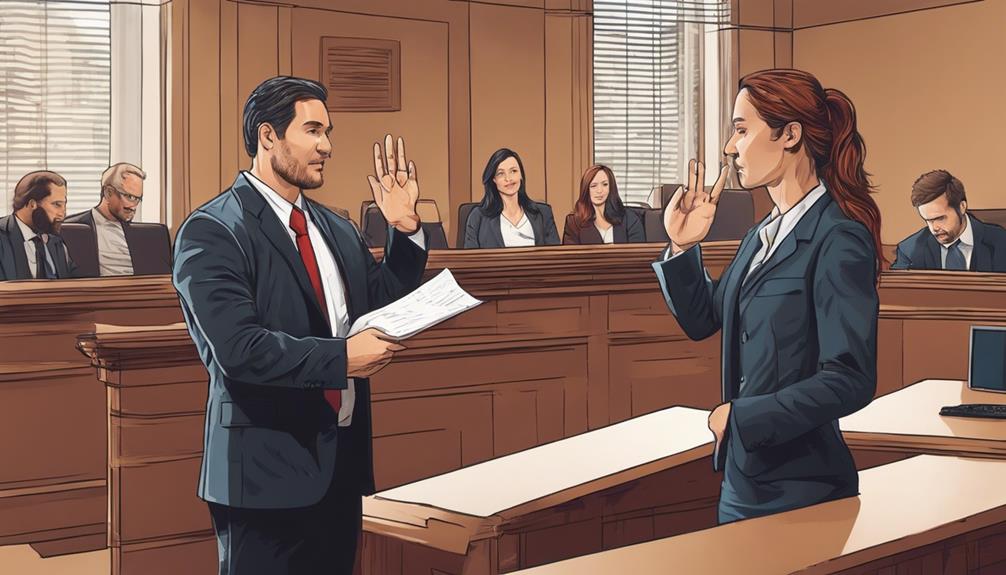
Lawyers must ensure ADA compliance in legal settings to accommodate deaf clients effectively. It's crucial for legal professionals to understand the specific needs of deaf or hard of hearing individuals to provide appropriate communication access. Ensuring effective communication involves implementing necessary accommodations such as sign language interpreters, real-time captioning services, or assistive listening devices. By proactively addressing these requirements, lawyers can create an inclusive environment where deaf clients feel respected and understood.
Failure to meet ADA compliance in legal settings can result in discrimination lawsuits and violations of the law. Regardless of the size or specialization of a law office, the obligation to cater to the needs of deaf clients remains paramount. It's essential for lawyers to engage in open dialogue with deaf clients to determine their preferred communication methods and ensure smooth interaction throughout legal proceedings. By prioritizing ADA compliance and effective communication, legal professionals can uphold the rights of all individuals, including those who are deaf or hard of hearing.
Deaf Client Representation
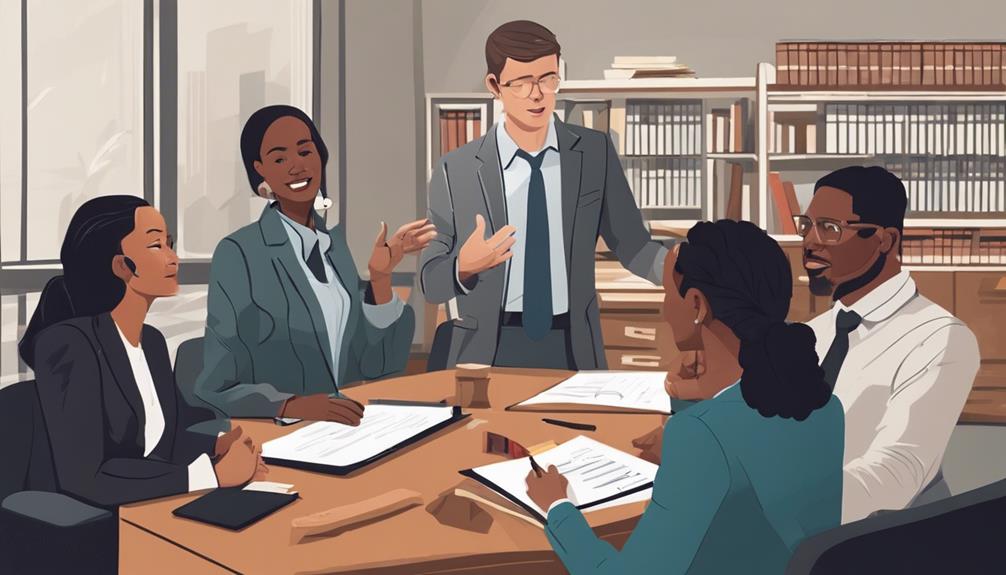
In our commitment to ensuring ADA compliance in legal settings for deaf clients, it's imperative to focus on the representation and support provided to these individuals throughout the legal process.
When representing deaf clients, it's crucial to consider the following:
- Legal Obligation: Lawyers have a legal responsibility under the ADA to ensure effective communication for deaf clients. This includes providing accommodations such as sign language interpreters or assistive listening devices.
- Communication Methods: Understanding and respecting the preferred communication methods of deaf clients is essential for successful representation. This may involve using written notes, lip-reading, or other visual aids to facilitate clear communication.
- Equal Access: Deaf clients deserve equal access to legal services, which means providing them with the necessary tools and accommodations to participate fully in the legal process. This ensures fairness and avoids potential discrimination lawsuits.
- Client-Lawyer Relationship: By providing adequate accommodations for deaf clients, lawyers can enhance the client-lawyer relationship, promote trust, and uphold ethical standards in legal practice. Effective communication leads to better outcomes for all parties involved.
Educating Legal Professionals

When educating legal professionals on accommodating deaf clients, it's crucial to emphasize real-life scenarios and practical communication strategies.
Understanding legal obligations under the Americans with Disabilities Act (ADA) is paramount. Online Continuing Legal Education (CLE) courses, such as the one developed by Sharon Caserta, offer invaluable insights into effective communication strategies and the ADA requirements.
These courses not only fulfill CLE credit requirements but also provide essential knowledge on accommodating clients with disabilities.
Navigating Court Proceedings

We understand that navigating court proceedings can be complex for deaf clients. Ensuring effective communication strategies and protecting legal rights are crucial during this process.
It's essential to advocate for appropriate accommodations to guarantee fair access to justice.
Courtroom Communication Strategies
To effectively navigate court proceedings, lawyers representing deaf clients must prioritize arranging qualified sign language interpreters and utilizing non-verbal communication cues and visual aids for enhanced understanding. When advocating for deaf clients in court, consider these strategies:
- Qualified Interpreters: Ensure the availability of skilled sign language interpreters for seamless communication.
- Non-Verbal Cues: Use gestures and facial expressions to supplement verbal communication for clarity.
- Visual Aids: Employ diagrams, charts, and written materials to enhance comprehension of complex legal information.
- Assistive Devices: Confirm that the courtroom is equipped with assistive listening devices to facilitate participation for deaf clients.
Legal Rights Protection
Navigating court proceedings to protect the legal rights of deaf clients requires ensuring effective communication through the provision of necessary accommodations, such as qualified sign language interpreters, as mandated by the ADA. When advocating for deaf clients in legal settings, it is essential to prioritize their access to communication through reasonable accommodations. The table below outlines key considerations for lawyers representing deaf clients in court to uphold their rights and ensure equal participation in the legal process.
| Consideration | Description |
|---|---|
| Requesting Accommodations | Lawyers should assist deaf clients in requesting qualified sign language interpreters for court proceedings. |
| Ensuring Effective Communication | Proactive communication with clients helps determine their needs for auxiliary aids and services in court. |
| Preventing Discrimination | Failure to provide necessary accommodations may lead to discrimination against deaf clients, violating ADA rules. |
| Equal Access to Justice | Informing clients of their rights to auxiliary aids ensures they have equal access to justice during legal proceedings. |
Accessing Legal Resources

When seeking legal resources as a deaf client, exploring state agencies, university ASL lists, senior support services, and the Deaf Interpreters Directory can provide valuable assistance in navigating the legal system.
- State Agencies: State agencies dedicated to serving Deaf and Hard of Hearing individuals offer tailored legal resources and support.
- University ASL Lists: Universities maintain lists of American Sign Language (ASL) resources, aiding deaf clients in finding legal assistance.
- Senior Support Services: Senior resources can provide guidance and assistance to deaf clients navigating legal complexities.
- Deaf Interpreters Directory: The Deaf Interpreters Directory specializes in legal services, offering crucial communication support to deaf clients in need.
These resources not only enhance access to legal aid but also ensure effective communication and understanding throughout the legal process. By leveraging these diverse channels, deaf clients can empower themselves with the necessary tools to navigate the legal landscape successfully.
Empowering Deaf Clients
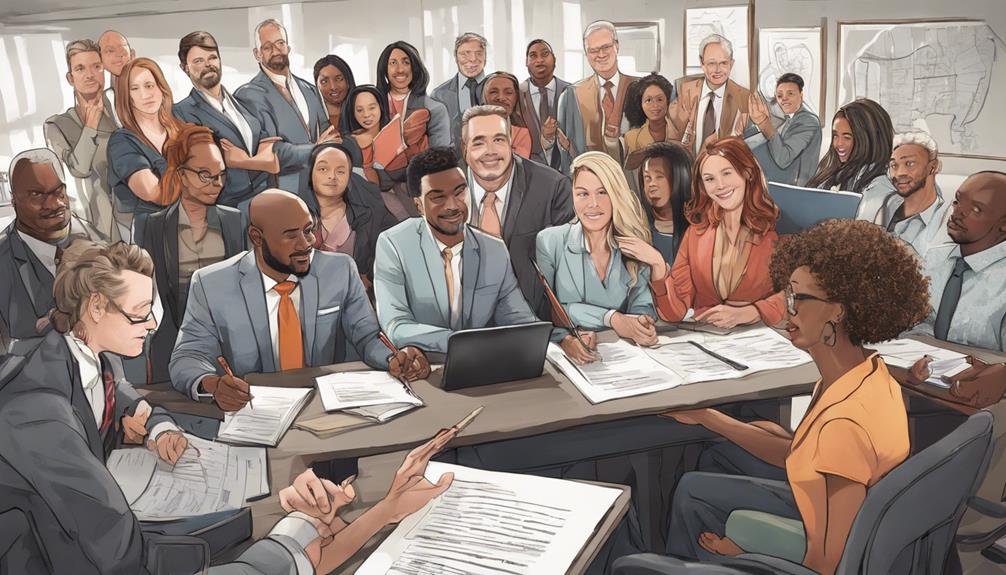
Empowering deaf clients through effective communication aids and services is a crucial aspect of ensuring their equal access to legal services as mandated by the ADA. Prioritizing the communication needs of deaf clients not only aligns with ADA requirements but also fosters inclusivity and respect within the legal system.
By accommodating deaf clients, lawyers enhance their ability to participate in legal proceedings, understand their rights, and engage meaningfully in the legal process. Providing effective communication with deaf clients isn't just about meeting a legal obligation; it's about building trust, ensuring comprehension, and ultimately achieving successful outcomes in legal matters.
Empowering deaf clients through accommodation promotes equitable treatment and reinforces the principles of fairness and justice. By embracing innovative approaches to communication and actively involving deaf clients in the legal process, lawyers can create a more inclusive and accessible legal environment for all individuals, regardless of hearing ability.
Frequently Asked Questions
How Does the ADA Support Deaf People?
The ADA supports deaf people by mandating effective communication through auxiliary aids like sign language interpreters. It ensures equal access to legal services by requiring accommodations for effective interaction. Failure to comply can lead to legal consequences, emphasizing adherence.
Deaf individuals are protected under the ADA to guarantee the same level of service and access as non-disabled individuals. This ensures inclusivity and accessibility for all, promoting equality and fairness in legal settings.
What Are the Three Federal Laws That Protect Deaf People?
We're diving into the laws that safeguard the deaf community, highlighting the Americans with Disabilities Act (ADA), the Rehabilitation Act, and the Individuals with Disabilities Education Act (IDEA).
These laws are the backbone of equal rights, ensuring access and accommodations for those with hearing impairments. ADA tackles discrimination in employment and public services, while the Rehabilitation Act extends this protection to federally funded programs. IDEA secures special education services for deaf or hard of hearing children.
How Do I Advocate for Deaf People?
Advocating for deaf individuals involves ensuring effective communication through qualified interpreters and auxiliary aids, understanding legal obligations under the ADA, and collaborating with advocacy organizations.
Educating oneself on the communication needs of deaf clients is crucial for effective advocacy.
How Do You Accommodate a Deaf Customer?
Accommodating a deaf customer involves crucial steps like providing sign language interpreters, using CART services for real-time captioning, and offering assistive technology.
Direct communication with the customer to determine their preferred method is essential. Training staff to communicate effectively with deaf clients is key.
One interesting statistic is that 48 million Americans have some degree of hearing loss, showing the significance of accommodating deaf customers for inclusivity.
How Can Deaf Clients Access ADA Lawyer Services for Deaf Events in 2024?
Deaf clients can access ADA lawyer services for deaf events in 2024 by utilizing online directories and search engines to find “deaf events 2024 near me” and then reaching out to local legal organizations specializing in disability rights. These organizations can provide guidance and representation for accessing ADA accommodations at deaf events.
How Can Deaf and Hard of Hearing Teaching Certification Help with ADA Compliance for Deaf Clients?
Obtaining a teaching certification for deaf individuals can greatly improve ADA compliance for deaf clients. Educators with this certification have the necessary skills and knowledge to effectively communicate with deaf and hard of hearing individuals, ensuring equal access to education and services in accordance with ADA guidelines.
Conclusion
In conclusion, it's imperative for legal professionals to prioritize the needs of deaf clients by providing appropriate accommodations and advocating for equal access to legal services.
By understanding and implementing ADA guidelines, we can ensure that all individuals, regardless of their hearing abilities, receive fair and effective representation.
Let's continue to work towards creating a more inclusive and accessible legal system for all.

